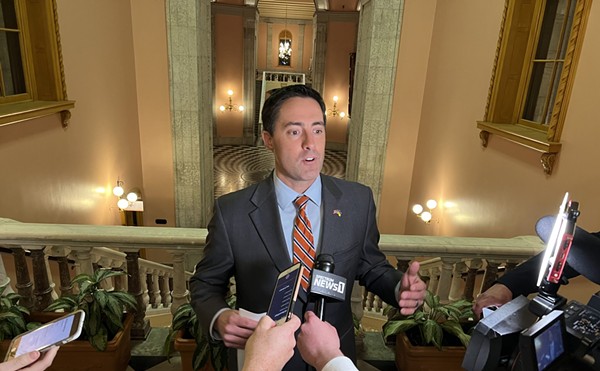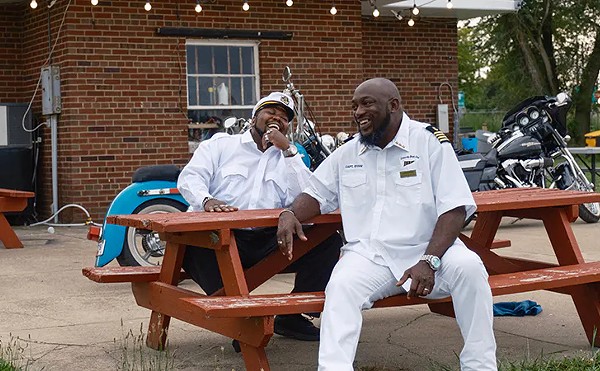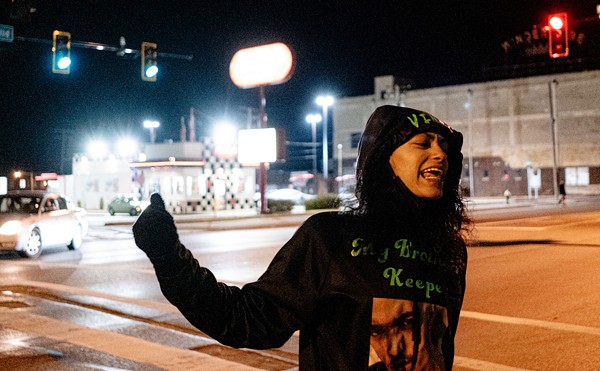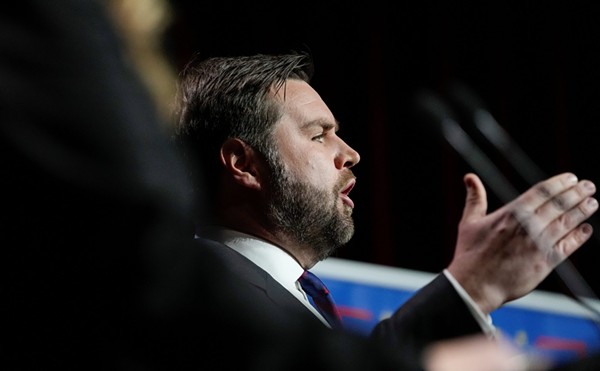It's a strategic move on his part.
"I want people to see my face," says the 31-year-old little-known candidate for elected office. "If you don't have name recognition, you have to get out and meet the voters face to face."
And Kelley has a great face for politics. Square-jawed and classically handsome, with blue eyes and sandy-brown hair parted to the side, he looks like someone cast to play a politician.
He's got the right personal profile, too: Social worker with a master's degree. Former Jesuit volunteer. A husband and the father of two daughters. Drinks his hot chocolate straight -- without whipped cream.
The only quirk in this straight-up bio is his penchant for playing the harp.
Kelley yearns to be a politician, specifically the next state representative in Ohio's 13th District. This is his second political campaign on the West Side. In 1997, he ran in a crowded primary for Cleveland City Council in Ward 14, where he finished a close third behind Nelson Cintron and Angel Guzman. Initially, Kelley disputed the outcome. In one of the ward's precincts, about 40 voters agreed to display his yard signs, yet he garnered only five votes in the area. He thought something was amiss. Then some advisers explained lesson one of politics: "Yard signs don't vote."
Kelley's been thinking about voters ever since and decided last March that an open seat in the state legislature was a realistic campaign goal. So did Democratic Party leaders, who encouraged him and said that, if he worked hard, he could likely win the seat, gain valuable experience, and ultimately develop into a political star for the party.
But all that changed last fall when former Congresswoman Mary Rose Oakar announced she wanted the same seat. The legendary politician, who was born on Cleveland's West Side, launched her political career in 1973 as a Ward 14 councilwoman before being elected to Congress in 1977 for eight consecutive terms.
As soon as Oakar entered the race, some of Kelley's supporters abandoned him -- clear testimony to the loyalty and power she still commands nearly eight years after leaving political office.
To the 59-year-old Oakar, this race could be the one that resurrects a political career that ended with a humiliating defeat in 1992 at the hands of then-untested Republican Martin Hoke and was tainted three years later when she was indicted on seven charges related to the Justice Department's investigation of overdrafts at the House Bank. In the end, the government dropped five of the charges, and Oakar pleaded guilty to two election-law misdemeanors related to the investigation.
But that's unlikely to matter in a home district, where politicians traditionally can do no wrong. And among some areas of the district -- which includes much of western Cleveland, Newburgh Heights, Cuyahoga Heights, and part of Garfield Heights -- people remember only the money she wrestled as a congresswoman from the Feds for highway sound barriers and senior centers.
On the campaign trail, her cherubic face, accented with bright red lipstick, is familiar. So are her smile and the gold cross and ribbon-shaped lapel pin she always wears in public. She exudes a nurturing style, but it's one that critics say masks a calculating and political nature.
Take, for instance, her stance in this race. The veteran of hardball politics and a successful litigant in a multimillion-dollar libel lawsuit against The Plain Dealer acts oblivious to the politics around her. "I'm not running against anybody," she claims. "I'm running for the people."
Kelley, of course, is hoping voters will not be so anxious to forgive and forget her political past. But the snow is falling so hard today that each footprint Kelley leaves on the slushy street disappears almost immediately -- a suggestion, perhaps, that he was never here.
With Friends Like These . . .
Although the race for state representative in the 13th District is unlikely to generate much excitement at the polls next month, it continues to create plenty of sparks within Cleveland's Democratic Party. And it has illuminated the intrigue of the democratic process, which ultimately proves to be less about issues and more about alliances, paybacks, and threats -- in short, politics.
Ironically, Kelley has now been cast by some party leaders as an overly ambitious, inexperienced candidate waging a quixotic battle for a seat too important for his inexperience. His recalcitrant stance to remain in the race without official party backing has set off behind-the-scenes maneuvering rarely seen in a race for state rep -- typically a low-profile, two-year political office. The race has divided friends and made allies out of enemies. Even the city's most powerful pol -- Mayor Michael White -- has gotten involved, backing Kelley and keeping an eye on Oakar as a potential mayoral aspirant. As for Kelley himself, he's fighting to eclipse the powerful name recognition of Oakar while trying to avoid being run over by his own party machine.
"I would not hold against him what he's doing in District 13, but I'm not happy with the fact that he is not folding his tent and supporting Mary Rose Oakar," says Democratic Party Chairman Jimmy Dimora, who initially was excited about Kelley's prospects. "I think he is a good, credible candidate, somebody that we can look for running for office down the road, even though this one is not going to work out."
In response to some of the recent events surrounding this race, Democratic ward club leader Tom Newman observes, "We don't need the Republicans to fight, we do it just fine ourselves."
At the center of the intraparty bickering is the tempestuous County Recorder, Patrick J. O'Malley, Kelley's strongest ally. A former wrestler, O'Malley is no stranger to brawls, and his passion for politics has made him one of the more meddling but loyal elected officials in the party. He, County Prosecutor Bill Mason, and Brook Park Mayor Tom Coyne organized what has become known as D-2000, a network of mostly West Side Democratic politicians and activists pushing their own agenda within the party.
O'Malley used D-2000's grassroots strength to win his party's appointment in 1997 to the Recorder's Office, a position he defended with a victory in the general election a year later. Running that election campaign was Kelley. The two met during the 1997 primary, when O'Malley was helping then-city council candidate Nelson Cintron, who also has become an ally of Kelley.
When Kelley announced his candidacy, he had the backing of D-2000, whose leadership was among those who hosted his kickoff party. Also backing him were Tony George, a wealthy real-estate developer from Fairview Park known for his Democratic fund-raising, and George's wife, Kristine.
But since Oakar jumped into the race, Kelley's D-2000 support has faded, and the Georges have taken their backing and dollars to Oakar, whom they have long supported.
While Mason still supports Kelley, he is quiet about it -- occupied with thoughts of potential opponents in his own reelection and strategies for the Sam Sheppard trial.
Coyne, according to Kelley, is still with him, but -- following the party's official backing of Oakar -- asked that his name not appear on any more of Kelley's campaign literature.
Only O'Malley remains publicly supportive of Kelley.
But with his support comes a problem: Kelley is caught in the middle of an ongoing feud between O'Malley and Tony George, whom O'Malley accuses of backing candidates to run against him this year, in part for his support of Kelley. (In the upcoming primary, O'Malley faces seven candidates, five with Irish surnames, including another O'Malley. George has said he's only officially backed one: a businessman named John F. Kennedy.)
So how does this affect Kelley? O'Malley has introduced Kelley into his own reelection campaign for County Recorder's Office. In an upcoming piece of campaign literature targeted for Garfield Heights, an Oakar stronghold within the district, O'Malley -- who twice campaigned for Oakar in past elections -- attacks Oakar for engaging in "dirty tricks again." He writes: "Because I am supporting my friend, Kevin Kelley, in the State House race, the Mary Rose Oakar gang has recruited a man with the same last name to run against me . . . I have been told that he -- the other O'Malley -- would be removed from my race if I pressured Kelley to withdraw. I will stand by my friend, the same way Garfield Heights has stood by me."
("I don't have one thing to do with the people running against Pat O'Malley," Oakar snaps. "If I were putting someone in the race, he'd know it.")
While O'Malley has publicly supported Kelley, he has worked behind the scenes to entice the young candidate away from the race. With the help of Jimmy Dimora, he lined up a $55,000 position in Kelley's field, which paid considerably more than the $42,500 state representative seat. "I wanted to give him an option if he had second thoughts about staying in the race," says O'Malley.
O'Malley didn't expect Kelley to give up his political aspirations, just delay them. As part of the deal, he made a bold request: He wanted Oakar and the current 13th District state representative, Barbara Pringle, to endorse Kelley two years from now for Cleveland City Council in Ward 15 -- where Kelley doesn't even live.
But Pringle, who reaches the state's term limit at the end of this year, told O'Malley no way. "I said, "No. I might run for the [council] seat,'" says Pringle, who's had a friendly relationship with the D-2000 leadership.
Pringle recruited Oakar for the Ohio House seat because she wanted a woman to take her place. But Kelley's sex wasn't all that played in her decision to back Oakar. She says she was upset with the D-2000 leaders, who never sought her input on Kelley as a possible candidate. "When my seat came up, these guys [D-2000] said, "Kelley's our candidate.' I resented that these guys who don't live here are telling me who I should pick."
Despite all the politicking on his behalf and behind his back, Kelley says he would not have taken the deal, even with the promise of Pringle and Oakar's endorsement in the Ward 15 council seat.
"I've turned down the offer, because I'd be changing my direction mostly for more money," he says. "That's not the way I do things. I'm committed to the race as I have been from the beginning."
There's Something About Mary
The best example of knockdown party politics in this race has been the battle for the party endorsement -- which went to Oakar. With it came huge riches: election mailings to voters that include a sample ballot denoting approved candidates, labor's vote, and the open support of fellow Democrats who are free to promote the blessed candidate.
The irony, though, is that the whole endorsement process has more to do with political favors, ring kissing, and party protocol than issues. Kevin Kelley, for example, spent more time pushing the fact that he was not Mary Rose Oakar than on what he'd do in office.
Throughout the behind-the-scenes campaigning for votes among active party members -- collectively known as the executive committee -- Kelley consistently promoted the theory that Oakar, if elected, will leave the office to run for Cleveland mayor in 2001. Fueling this theory was Oakar's unwillingness, he says, to "commit to finishing her term." Oakar, clearly weighing the meaning of her words during interviews with party members and the press, said many times that she has "every intention" of completing her term.
"That's not the same as committing to stay in office," says Kelley, who has gained support from executive committee members, who believe Oakar will leave office early if elected. "She won't use the word "commit.' The people of the district can't afford to have someone leave to campaign after just a few months."
"How does he know what I want to do?" Oakar responds. "I've never had more than a five-minute conversation with him. I'm amused by that. My intention is to focus on this job and do a good job. If I were thinking that, in only two years, I'm going to get Mike White, I would not be running for this office. It doesn't make sense. This isn't a stepping-stone."
It may not be, but a lot of politicos think it is. Mayor White, for example, is obviously interested in seeing any potential mayoral candidates short-circuited. He contributed $1,000 to Kelley's campaign, and a member of the mayor's staff, Joe Nanni, attends meetings with Kelley's campaign planners.
"The mayor supports Kevin because he is a good man, and it is time to move forward, not backward," says White spokeswoman Nancy Lesic.
Kelley is quick to point out that White has no ulterior motive in supporting him. "His support is not contingent on anything," says Kelley, who has met with the mayor to talk about the race. "He was only concerned about how the race might affect my family. We didn't really talk about Mary Rose Oakar."
Dimora says he does not know Oakar's true intentions, but believes a victory in the race will help her, should she seek another office in the future. "In Mary Rose Oakar's particular case, she is trying to take away a blemish on her reputation and past track record, and this will give her a step in that direction."
Ultimately, the mayoral issue didn't help Kelley win the party endorsement, but it contributed to Oakar not being endorsed by ward leaders.
Before the party endorsement vote, ward leaders living within the house district had the chance to interview the candidates and hold their own straw poll -- known as a "recommendation." To win the recommendation, a candidate needs a simple majority of ward leaders present at the meeting.
Neither Kelley nor Oakar could muster a majority at the meeting, but that wasn't for lack of trying. They both fought hard for the vote of Ward 18 leader Matt Zone, who pledged early to support Kelley, but whose family and boss, Judge Cheryl S. Karner, are friendly with Oakar. In the end, he abstained. And there was a skirmish over the attempted ouster by Oakar supporters of a co-ward leader who supported Kelley.
(The race's two other candidates, 26-year-old Brian Hodous and 40-year-old Peter Kazarovich, had little backing from party leaders and didn't become an issue in the voting.)
Usually, when ward leaders don't make an endorsement, the party doesn't either. That is not what happened at the executive committee meeting in December. Oakar won 24 votes to Kelley's 12, enough to push her over the 60 percent majority that is required to win the party's endorsement.
The Kelley-Oakar vote was the most contentious of the races voted on by party members that day. Kelley still contends that party politics played against him. He has accused party chairman Dimora of appointing several Oakar supporters to the executive committee less than a week before the vote, filling slots that had been vacant for months. In particular, he says, several key positions were filled in Garfield Heights at the recommendation of Garfield Heights Councilwoman Rose Lovano, an Oakar supporter.
"This issue is simply about the party chairman allowing last-minute appointments and engineering an endorsement that wasn't there days prior to the December 18 [meeting]," he says.
During the executive committee proceedings, Kelley and his supporters protested. Dimora reacted angrily, yelling, "Mr. Kelley, you want me to deny a great Democrat like Rose Lovano her allotment of members. I'm not going to do it."
Kelley questions the timing of the appointments and maintains that Oakar would not have had enough votes to win a 60 percent majority without them.
"Sure, I would have loved to have [the nominees] in my hands in September, like everybody else," admits Dimora, who says Lovano was entitled to them nonetheless. "No question the Kevin and Mary Rose Oakar race was incentive to find somebody. Prior to that, she wasn't aggressive in looking."
Since the endorsement, Cleveland City Councilman Michael O'Malley -- Patrick J. O'Malley's brother and a supporter of Kelley -- has introduced a party amendment to ban appointments to the executive committee in the week between the ward leader vote and the party endorsement vote. It is expected to pass.
For his part, Kelley is trying to get beyond this. "It's not my intention to have a long-standing feud with Jimmy," he says. "I've moved on, and I just keep campaigning. So I wish Jimmy well, but please don't throw a rock through my window and try to convince me that it is air conditioning."
Campaign Trail Baloney
With the endorsement process behind them, Kelley and Oakar have turned their attentions to campaigning, each with their own style and strategies. Kelley's been focusing on door-to-door visits; Oakar, on senior centers and apartments, retiree groups, and neighborhood meetings.
Seeing Oakar on the campaign trail makes it hard to imagine she's been out of office for nearly eight years. She knows many voters by name, has something to say about every issue -- particularly those relating to Congress -- and has eager volunteers behind her.
Her former congressional district office -- located near the corner of Lorain Avenue and West 25th -- which also serves as her business office, has hardly changed. A large "Re-Elect Oakar" sign from her last congressional race hangs on the building's west facade. Inside, blue signs with bright orange lettering left over from the same race lean against the wall. Stickers have been placed over the word "Re-Elect," making them good to go in this campaign.
Her desk is cluttered with stacks of paper and memorabilia from her congressional days. Pictures of her and politicians are displayed everywhere, including one of her and George Stephanopoulos.
Sitting behind her desk, which faces a large glass window looking onto the street, she has a hard time not being distracted by passersby. During a recent interview, she noticed someone waving. Her eyes lit up as she acknowledged the greeting. She whispered, "Oh, one of my constituents."
On a recent day, at a meeting of retired steelworkers held at Ruggles Inn on Harvard Road, Oakar plays the audience perfectly. Dressed in a conservative blue suit and plaid flannel cap, she introduces herself to each table before grabbing a plate of food and sitting among the retirees. She begins her speech by noting that her father, too, was a steelworker and then hits all the right themes: Social Security and prescription drug coverage.
"You always read in these articles about Social Security going bankrupt and all that baloney," she says. "It's total baloney, if you pardon me using that expression . . . It has a trillion-dollar surplus, it's not going bankrupt, that's an absolute lie . . . If Social Security was so bad, why does Wall Street want it so bad? . . . I would be opposed to any resolutions, excuse me -- of the state legislature -- that recommend to Congress and to the president that it should be privatized."
She never mentions her opponent and ends with a gracious but politically motivated goodbye: "Thanks to all of you, the union, and this local. I want to be state representative because that's where the action is, and I care about all of you."
Kelley's been spending his time trying to show voters that he, too, cares. He's taken a partial leave of absence from his job to allow himself more time to meet voters. Miserable weather doesn't deter him.
On a recent day, working off a list from the County Board of Elections that notes the names and addresses of Democrats who vote regularly in primaries, Kelley attempts to put in face time with these voters. As he approaches the first house on the list, he struggles to find the walkway in the deep snow, so he cuts his own path to the door and knocks.
"Good afternoon. Is Charles home?" Kelley shouts to a man who's opened a small crack in the door.
"No, there's no one here with that name," replies the man, who hesitates a moment before relaying the bad news.
Charles, the regular voter Kelley has come to see, is dead.
"Oh, I'm sorry to bother you," Kelley apologizes. He attempts to make a note of this on his voter list, but his ballpoint pen is frozen dry.
At the next address, Kelley is greeted by a pleasant middle-aged woman wearing a Notre Dame sweatshirt. She's the voter on his list, alive and interested, opening the door wide to take a good look at Kelley.
"Hi. My name is Kevin Kelley, and I'm running for your state representative seat. I just want to introduce myself and drop off one of my cards," he begins, passing the woman his campaign flier, which features his picture and résumé. "I want to tell you three quick things about the race."
The woman listens.
"The primary is early this year; it's on March 7," he explains, pausing for a moment to let the woman absorb the information. "I am a Democrat, and . . ."
Kelley then pauses again, but longer, to signal that the most important information is about to come. In a loud voice that seems intended to jar loose some reaction, he continues, "I am running against Mary Rose Oakar."
It's an unusual move, because conventional campaign wisdom says an unknown candidate should never promote the name of his or her main opponent. But Oakar is no ordinary candidate. She is a once-powerful politician. Kelley is hoping that voters will remember the alleged scandals -- although he does not specifically raise such issues with voters in person. Instead, he plays off their reaction to Oakar's name. There have been plenty of reactions, both positive and negative.
When Kelley meets an Oakar supporter, he doesn't attack his opponent. He offers a question: "Ask yourself if you want to go back to the way things were, politics as usual, or have a fresh perspective."
Kelley, however, has created campaign literature that makes an issue of Oakar's trouble with election laws and her work on Republican Kenneth Blackwell's successful 1998 campaign for Ohio Secretary of State. The literature is "sour grapes for not winning the endorsement," says one party official, who did not want to be identified because "I don't want to get in the middle of this one."
But the woman before Kelley today appears unaware of such issues and recalls receiving an application for an absentee ballot from Oakar. As Kelley steps away from the door, though, she says, "You're young, I'll vote for you."
This is the type of reaction that brings an instant smile to Kelley's face and gives him cause to ask her later to display a yard sign on his behalf.
Following the same script, Kelley meets about a dozen voters on this day. The reactions are generally positive. As he makes his way back down the street, he reviews his list of names, trying to decide what streets he will walk the next day. He knows he must keep the momentum going.
When he returns to his 1995 Saturn sedan, he finds that its rear left tire is nearly flat.











